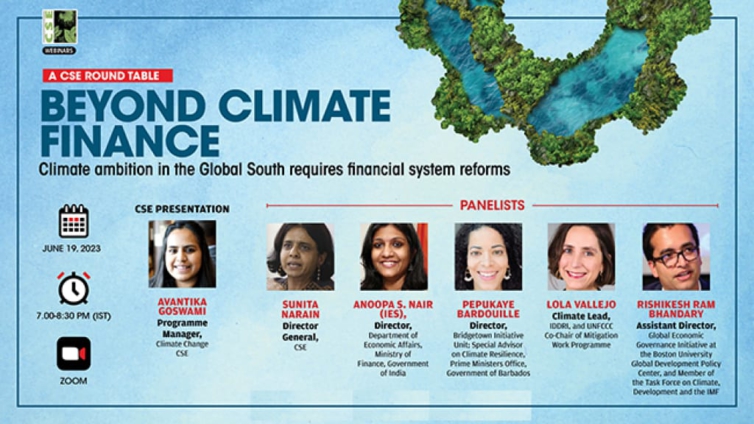India-based Centre for Science and Environment's (CSE) latest report has revealed that the US $100 billion a year pledged in 2009 is too little, too late and inadequate to address issues of climate change.
The report said, what is rarely discussed is that whatever is offered in the name of climate money is not concessional, with just around 5% distributed as grants and the rest as loans or equity from 2011 to 2020.
"It is then no surprise that what is termed as climate finance is not going to the countries where it is needed the most,” said Sunita Narain, director general, Centre for Science and Environment (CSE).
According to a new CSE analysis, climate ambition in the Global South cannot be realized without financial sector reforms.
The report comes only days before the international summit on the New Global Financial Pact begins in Paris.
Narain was speaking at a recent webinar when CSE released its latest research, Beyond climate financing.
The webinar, which featured worldwide experts, and the research preceded the two-day summit for a new worldwide financial pact, which will begin today, June 22, 2023, in Paris, France.
The CSE report stated that developing countries confront additional financial challenges that impede their climate ambitions, such as a growing debt crisis. According to data from Debt Justice, a UK-based non-profit, 91 of the poorest countries made external debt-service payments average 16.3 percent of their government revenues in 2023.
According to the analysis, many low and middle-income nations pay more in annual debt servicing costs than they would need to spend to meet their NDC targets.
Avantika Goswami, CSE's project manager for climate change said, poor countries are the places where losses and harm from climate change are concentrated.
"These are also the countries that need finance for the climate transition to help them develop, without adding significantly to the stock of greenhouse emissions.”
Goswami expanded on Narain's statement that just 16% of overall climate finance is concessional - money offered on favorable terms such as grants or low-interest loans.
"The money that is flowing towards climate projects is heavily concentrated in North America, Western EU and East Asia predominantly China. This is where most of the growth in clean energy investment has been concentrated as well. So, the money is not going to the poorest, most vulnerable countries.”
Goswami also indicated that, emerging economies and developing countries other than China will require $1 trillion in foreign credit by 2030.
According to Goswami, developing countries suffer excessively high capital costs, particularly for green technologies, which reduces the economic viability of clean energy investment in these countries, despite the fact that they have abundant renewable resources.
The report also talked about multilateral development banks (MDBs), a major source of concessional finance, and that they are risk-averse and deliver 80% of climate finance as loans, exacerbating the debt crisis.
"There is also limited eligibility for middle-income countries to access concessional finance. To add to this, MDBs’ mandate is being expanded to make financial flows 'Paris-aligned'; this could be paternalistic and impose top-down criteria that may narrow funding streams to developing countries," said the CSE report.
Concerning the pressure to decarbonize, Narain stated that, in the context of larger systemic financial barriers, it appears that the walls are closing in on the Global South from all sides, adding that it is unacceptable to say at UNFCCC forums that developing countries do not want to take on climate ambition.
"The reality is that most of them simply cannot afford it. This system is broken and needs urgent reform. Climate ambition cannot be unlocked whilst operating in a financial system that is inequitable by design.”
According to the report, the Global South requires extra and concessional financing flows for climate mitigation, adaptation, and loss and damage. Existing financing pools cannot be repackaged by clever accounting, hence 'additionality' is critical.
The 'divide and conquer technique' against the poor must be abandoned. Middle-income countries should have greater access to concessional financing and debt relief.
It said that the Paris Agreement on Global Finance cannot be used to undermine national sovereignty and reduce critical funding flows for development.
"We need a multilateral, rules-based approach to solving the debt crisis, and we must stop the creation of new debt. We cannot rely on the private sector to solve climate change—climate action is a public good."
Experts at CSE are looking forward to 2023, a year in which civil society and scholars will increase pressure and demand urgent systemic reforms for the Global South.
Latest Stories
-
Ghana-Russia Centre to run Russian language courses in Ghana
5 hours -
The Hidden Costs of Hunger: How food insecurity undermines mental and physical health in the U.S.
6 hours -
18plus4NDC marks 3rd anniversary with victory celebration in Accra
8 hours -
CREMA workshop highlights collaborative efforts to sustain Akata Lagoon
9 hours -
2024/25 Ghana League: Heart of Lions remain top with win over Basake Holy Stars
10 hours -
Black Queens: Nora Hauptle shares cryptic WAFCON preparation message amid future uncertainty
10 hours -
Re-declaration of parliamentary results affront to our democracy – Joyce Bawah
10 hours -
GPL 2024/25: Vision FC score late to deny Young Apostles third home win
10 hours -
Enhancing community initiatives for coastal resilience: Insights from Keta Lagoon Complex Ramsar Site Workshop
10 hours -
Family Health University College earns a Presidential Charter
11 hours -
GPL 2024/25: Bibiani GoldStars beat Nsoatreman to keep title race alive
11 hours -
GPL 2024/25 Bechem United keep title hopes alive with narrow win over FC Samartex
11 hours -
2024/25: Dauda Saaka scores as Asante Kotoko beat Dreams FC
11 hours -
M.anifest reflects on galamsey’s devastation 11 years after ‘No Shortcut to Heaven’
12 hours -
We’ll have the last laugh – Sammy Gyamfi slams EC’s “cantata” re-collation
12 hours

